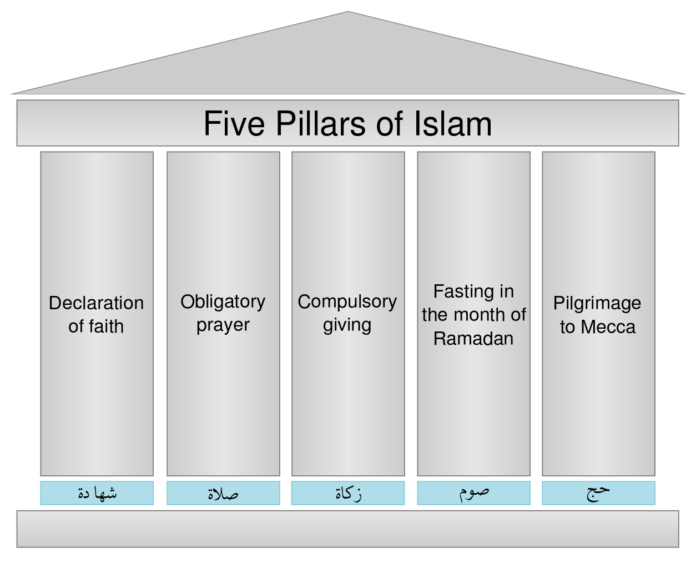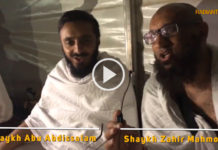عن أبي عـبد الرحمن عبد الله بن عـمر بـن الخطاب رضي الله عـنهما ، قـال : سمعت رسول الله صلى الله عليه وسـلم يقـول : ( بـني الإسـلام على خـمـس : شـهـادة أن لا إلـه إلا الله وأن محمد رسول الله ، وإقامة الصلاة ، وإيـتـاء الـزكـاة ، وحـج البيت ، وصـوم رمضان ) رواه البخاري [ رقم : 8 ] ومسلم [ رقم : 16 ]
On the authority of Abu `Abd ir-Rahmaan `Abdullaah, the son of `Umar ibn al-Khattab radiAllahu ‘anhumaa, who said: I heard the Messenger of Allah ﷺ say:
| Islaam has been built on five [pillars]: testifying that there is no deity worthy of worship except Allah and that Muhammad ﷺ is the Messenger of Allah, establishing the salaah (prayer), paying the zakaah (obligatory charity), making the Hajj (pilgrimage) to the House, and fasting in Ramadaan. [related by al-Bukhaari and Muslim] |
Explanation of Hadeeth 3
Abu al-‘Abbaas al-Qurtubee (rahimahu Allahu) has said that this hadeeth means that these five matters are the foundation and basic principles upon which the religion of al-Islaam is built. With these five matters does Islaam make itself apparent. And the Prophet ﷺ particularised these five matters and did not mention Jihaad along with them because these five matters are obligatory at all times.
And in some of the narrations of this hadeeth (such as the one quoted above), mention of the Hajj is made before mention of the Fasting in Ramadaan. However, and Allah knows best, the correct form is the placing of the Fasting before the Hajj, as is narrated from Ibn ‘Umar that he corrected a narrator who changed the order and said “This is how I have heard it from the Messenger of Allah ﷺ”. This incident shows us the precision of the Sahaabah and the scholars of Hadeeth after them in preserving the words of the Messenger ﷺ, and how can this not be when Allah ‘azza wa jall has said:
| “Verily We have sent down the Dhikr and We shall preserve it” |
and the Dhikr or Wahee sent down to the Prophet ﷺ includes both the Qur’aan and the Sunnah, as Allah has said:
| “Nor does he speak of (his own) desire; It is only an Inspiration that is inspired.” |
And it is also narrated from Ibn ‘Umar radiAllahu ‘anhu that the Messenger ﷺ said:
| “Islaam is built upon that you worship Allah (alone) and disbelieve in (the worship of) all that is other than Him, and the establishment of the Prayer, …(till the end of the hadeeth)” |
And in the hadeeth occurs the phrase ‘establishment’ of the prayer (iqaam as-salaah), as opposed to ‘performance’ of the prayer. The scholars have mentioned how this indicates that the Prayer must be performed in the most perfect manner, after having completed the wudoo’ in the most perfect manner, and in the Masjid with the jamaa’ah for the men, and so on and so forth. That is, simply performing the motions of the Prayer in the most minimal fashion is not what is desired from us – but rather we should exert ourselves in this affair, bearing in mind that the Prayer is the first matter that will be judged on the Day of Resurrection – if it is accepted then the rest of our actions will be accepted, and if it is rejected then the rest of our actions will also be rejected.
Summary
That Islaam is indeed built on the five principles of:
1) Witnessing that Allah is our only deity and Muhammad ﷺ is His Messenger to show us how to fulfill our existence on this earth as Muslims,
2) Prayer,
3) Zakaah,
4) Fasting and
5) Hajj
So one must strive to fulfill these pillars with the utmost care, concern and priority, and one must do so normally before one gets involved with other aspects of the Deen.






















